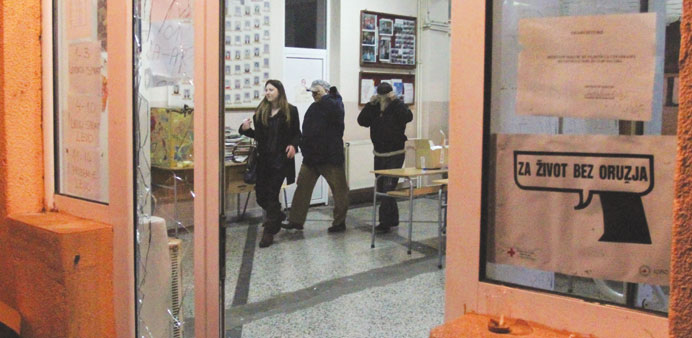Members of an election commission leave a polling station in the Saint Sava school after unknown persons attacked the site during the municipal elections in Kosovska Mitrovica.
Reuters/AFP/Brussels/Pristina
Nato and the European Union have condemned violence that took place during a weekend election in Kosovo that many had hoped would help end ethnic divisions but ended up underscoring the strength of Serb resistance instead.
Voting on Sunday in a small Serb pocket of the majority-Albanian country was halted after masked men attacked polling stations at three locations on the Serb side of the ethnically-divided town of Mitrovica, lobbing tear gas and smashing ballot boxes.
Participation of the Serb north in the Kosovo-wide council and mayoral elections was central to an accord brokered by the EU in April to integrate the north with the rest of the Balkan country, which declared independence from Serbia in 2008.
Agreement to the pact opened the door to EU membership talks with Serbia, pencilled in for January 2014.
But the 40,000-50,000 Serbs living in north Kosovo remain suspicious of the deal, and hardliners campaigned for a boycott of the election and in some cases openly intimidated would-be voters.
Serbia also officially rejects Kosovo’s freedom but it had encouraged the Serb minority to vote. This was to meet EU demands on ending de facto ethnic partition but also to gain more sway in Pristina institutions.
Turnout in parts of the north reached more than 20%, but barely 10% in the Serb half of Mitrovica.
Sunday’s events point to the challenge facing the EU, Serbia and Kosovo in implementing the deal brokered by EU foreign policy chief Catherine Ashton.
“We condemn the violent incidents of yesterday in Mitrovica north, because they have disrupted an otherwise very orderly run electoral process in the rest of Kosovo,” Maja Kocijancic, a spokeswoman for Ashton, told a press briefing in Brussels.
Nato, which has around 6,000 peacekeepers in Kosovo and deployed to the scene of Sunday’s attacks, said it would remain vigilant.
“The elections are an important element in the normalisation of relations between Belgrade and Pristina,” Secretary-General Anders Fogh Rasmussen told a news conference. “Violence should not be allowed to derail the progress achieved so far in this dialogue.”
Serbia had called on Serbs in northern Kosovo to take part in the municipal vote for the first time, after agreeing in the April accord to cede its de facto control over the north in exchange for EU accession talks.
Kosovo broke away in 1999 when Nato bombed for 11 weeks to halt the killing and expulsion of Albanian civilians by Serbian forces trying to crush a guerrilla insurgency. But the Serb north remains beyond the reach of the Kosovo authorities.
It was unclear whether the results of voting in the north would be deemed valid. Officials of the Organisation for Security and Co-operation in Europe (OSCE) scrambled to secure ballot boxes after the attack, as Nato helicopters flew over Mitrovica and EU police fanned out in armoured vehicles.
“Whatever the situation is, it is obvious that the election in the north of Kosovo failed,” Agron Bajrami, editor of the Kosovo daily Koha Ditore, said, but added that all sides would try to put a “positive spin” on events.
“The events yesterday seriously put in doubt the success that was hailed in Brussels,” he said. “Brussels, Belgrade and Pristina will have to sit down and see whether they can really make this agreement work.”
Sunday’s incidents have “hindered a large part” of the April EU-brokered accord, said Milivoje Mihajlovic, spokesman for the Serbian government.
“All three sides, Pristina, Serbia and the international community have to seriously deal with this problem,” Mihajlovic said.
In case the vote is repeated, Serbia “will have to send a clear message... that extremists and hooligans cannot act unpunished” in Serb-populated areas of Kosovo, said Belgrade-based analyst Vladimir Pejic.
Belgrade immediately accused the boycott campaign of being behind the attacks and blamed Kosovo police and Nato-led peacekeepers (KFOR) for failing to prevent them.
Marko Jaksic, a pro-boycott Kosovo Serb politician, rejected the allegations and accused Belgrade of staging the violence to cover up the low turnout.
“We had no reason to disturb the vote as it went in accordance to our wishes,” Jaksic told reporters.

